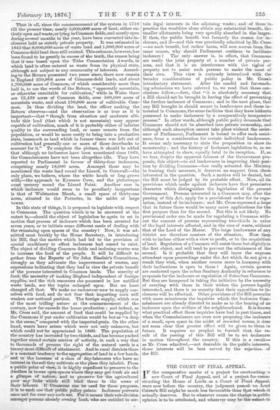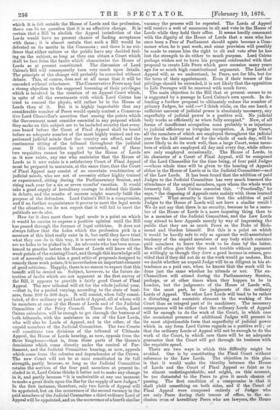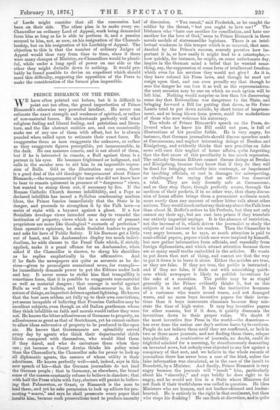THE COURT OF FINAL APPEAL.
IF the comparative merits of a project for constructing--a I new Court of Final Appeal, and of a project for recon- structing the House of Lords as a Court of Final Appeal, were now before the country, the judgment passed on Lord Cairns's Bill might be much less favourable than that whiehit actually deserves. But to whatever causes the change-in-public opinion is to be attributed, and whatever may be the extent to
which it is felt outside the House of Lords and the profession, there can be no question that it is an effective change. It is which it is felt outside the House of Lords and the profession, there can be no question that it is an effective change. It is certain that a Bill to abolish the Appeal jurisdiction of the Lords would have no present chance of finding acceptance with them ; it is almost certain that such a Bill would be defeated on its merits in the Commons ; and there is no evi- dence that either suitors or the public have any decided feel- ing on the subject, so long as they can obtain a Court which shall be free from the faults which characterise the House of Lords as at present constituted. The discussion of Lord Cairns's Bill will consequently turn very much upon details. The principle of the change will probably be conceded without debate. This, of course, does not at all mean that it will be conceded without reluctance. The Conservative Peers may feel a strong objection to the supposed lessening of their privileges which is involved in the creation of an Appeal Court which, in spite of all the sweetmeats with which Lord Cairns has tried to conceal the physic, will rather be in the House of Lords than of it. But it is highly improbable that any considerable number of Peers would openly contest a Conserva- tive Lord Chancellor's assertion that among the points which the Government must consider essential in any proposal which they make on this subject are to be included security that every case heard before the Court of Final Appeal shall be heard before an adequate number of the most highly trained and ex- perienced judicial minds that the country can afford, and the continuous sitting of the tribunal throughout the judicial year. If this assertion is not contested, and if these two requisites cannot be supplied by the House of Lords as it now exists, any one who maintains that the House of Lords as it now exists is a satisfactory Court of Final Appeal must be prepared to maintain, at the same time, that the Court of Final Appeal may consist of an uncertain combination of judicial minds, who are not of necessity either highly trained or experienced, sitting during the Parliamentary Session, and rising each year for a six or seven months' vacation. It would take a good supply of hereditary courage to defend this thesis in debate, and the results of success might scarcely fulfil the purpose of the defenders. Lord Cairns's Bill is a compromise, and if on further acquaintance it proves to meet the legal needs of the situation, we do not expect that it will fail to meet the politicals needs also. How far it does meet these legal needs is a point on which it would be unwise to express a positive opinion until the Bill has passed through the furnace of legal criticism. It does not always follow that the holes which the profession pick in a measure of this kind really exist in it, but until they have tried what they can do in this way, it is never safe to say that there are no holes to be picked in it. An advocate who has been accus- tomed to practise before the House of Lords will know all the weak points of the existing Court, and though this knowledge will not of necessity make him a good critic of proposals designed to remedy these weak points, it is nevertheless an important element of good criticism. Happily, there is no reason to expect that this benefit will be denied us. Subject, however, to the future de- tection of faults which are not apparent at the first survey of the Bill, it appears to provide a fairly good Court of Final Appeal. The new tribunal will sit for the whole judicial year, —that is, for a period varying, according to the state of busi- ness, from 200 to 300 days. It will consist, when fully consti- tuted, of five ordinary or paid Lords of Appeal, all of whom will be members at once of the House of Lords and of the Judicial Committee of the Privy Council. These five Lords, Lord Cairns calculates, will be enough to get through the business of both tribunals, with the assistance in one of the Law Lords, who will also be Lords of Appeal, and in the other, of the unpaid members of the Judicial Committee. The two Courts will constitute two divisions of the tribunal of Ultimate Appeal, the House of Lords hearing, as now, appeals from the three kingdoms—that is, from those parts of the Queen's dominions which come directly under the control of Par- liament, and the Judicial Committee hearing, as now, appeals which come from the colonies and dependencies of the Crown. The new Court will not be at once constituted in its full strength, partly because, so long as the Judicial Committee retains the services of the four paid members at present in- cluded in it, Lord Cairns thinks it better not to make any change in it, and partly because "it is undesirable at any one moment to make a great drain upon the Bar for the supply of new Judges." In the first instance, therefore, only two Lords of Appeal will be appointed, but on the occurrence of the second vacancy in the paid members of the Judicial Committee a third ordinary Lord of Appeal will be appointed, and on the occurrence of a fourth similar vacancy the process will be repeated. The Lords of Appeal will receive a writ of summons to sit and vote in the House of Lords while they hold their office. It seems hardly consonant with the dignity of the House of Lords that a man who has once been a Peer of Parliament should again become a Com- moner when he is past work, and some provision will possibly be made to ensure him the right to sit and vote after he has lost the strength to do either to much purpose. Lord Cairns perhaps wishes not to have his proposal confounded with that proposal to create Life Peers which gave occasion many years ago for so much high constitutional argument. The Lords of Appeal will, as we understand, be Peers, not for life, but for the term of their appointment. Even if their tenure of the privilege should be extended, it is not likely that the opposition to Life Peerages will be renewed with much force.
The main objection to the Bill that at present occurs to us is suggested by a passage in Lord Cairns's own speech. In de- fending a further proposal to ultimately reduce the number of primary Judges, he said :—" I think while, on the one hand, a sufficient amount of judicial power is absolutely 'necessary, any I superfluity of judicial power is a positive evil. No judicial !body works so efficiently as when fully occupied." Now, of all forms of insufficient occupation none probably is so injurious to judicial efficiency as irregular occupation. A large Court, all the members of which are employed throughout the jadicial year for the half instead of for the whole of each day, will be more likely to do its work well, than a large Court, some mem- bers of which are employed all day and every day, while others are only employed occasionally. The House of Lords, in its character of a Court of Final Appeal, will be composed of the Lord Chancellor for the time being, of four paid Judges —whose whole time will be given to the hearing of Appeals either in the House of Lords or in the Judicial Committee—and of the Law Lords. It has been found that the addition of paid Judges to the Judicial Committee has very much lessened the attendance of the unpaid members, upon whom the whole work formerly fell. Lord Cairns concedes this. "Practically," he says, " the disposing of Appeals rests mainly with these learned persons." What security is there that the addition of paid Judges to the House of Lords will not have a similar result ? We do not say that there is no security, because to be a mem- ber of the House of Lords is a more imposing thing than to be a member of the Judicial Committee, and the Law Lords may attend to hear Appeals merely by way of impressing the public that they are as much Peers as the Duke of Rich- mond and Gordon himself. But this is a point on which it would be hardly safe to rely as against the well-ascertained tendency of the unpaid members of any body which contains paid members to leave the work to be done by the latter. Men will often give their time and trouble without payment as willingly as though they drew a good income in return, pro- vided that if they did not do so the work would go undone. But we doubt whether an unpaid Judge will be as diligent in his at- tendance as a paid one, when he knows that the work will be done just the same whether he attends or not. The ex- Chancellors will attend during the Parliamentary Session, perhaps, or at other times when they happen to be in London, but the judgments of the House of Lords will, for the most part, be the judgments of the ordinary Lords of Appeal. The other Law Lords will tend to be rather a disturbing and eccentric element in the working of the Court than an integral part of its machinery. The necessary consequence will be either that the ordinary Lords of Appeal will be enough to do the work of the Court, in which case the occasional presence of additional Judges will present in its most objectionable form that superfluity of judicial power which in any form Lord Cairns regards as a positive evil ; or that the ordinary Lords of Appeal will not be enough to do the work of the Court, in which ease there will be no adequate guarantee that the Court will get through its business with the requisite speed.
There are two ways in which this difficulty might be avoided. One is by constituting the Final Court without reference to the Law Lords. The objection to this plan is that it would make the identity between the House of Lords and the Court of Final Appeal so faint as to be almost undistinguishable, and might, on this account, be too distasteful to the Peers to give it much chance of passing. The first condition of a compromise is that it shall yield something on both sides, and if the Court of Final Appeal were composed entirely of Judges who are only Peers during their tenure of office, to the ex- clusion even of hereditary Peers who are lawyers, the House of Lords might consider that all the concession had been on their side. The other plan is to make every ex- Chancellor an ordinary Lord of Appeal, work being demanded from him so long as he is able to perform it, and a pension secured to him, not, as now, on his resignation of the Chancel- lorship, but on his resignation of his Lordship of Appeal. The objection to this is that the number of ordinary Judges of Appeal would thus vary from time to time, since if there were many changes of Ministry, ex-Chanoellors would be plenti- ful, while under a long spell of power on one side or the other they might dwindle down to nothing. It would pro- bably be found possible to devise an expedient which should meet this difficulty, supposing the opposition of the Peers to make the consideration of the former plan impossible.




































 Previous page
Previous page